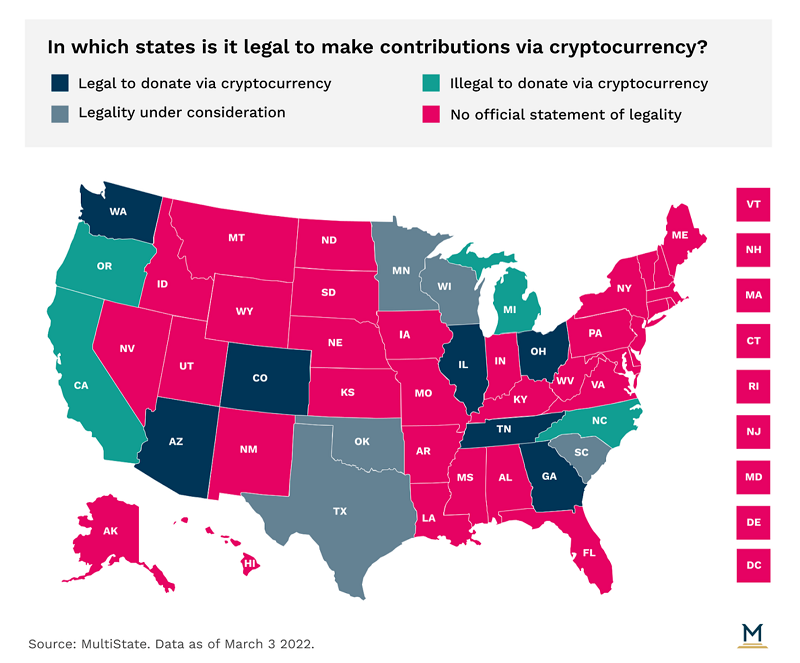
Key Takeaways
- CEO of crypto exchange FTX, Sam Bankman-Fried, donated $2 million to political groups in 2022, which is the 27th most on record. So far he has donated over $21 million in total to Democratic candidates and PAC’s.
- Two more FTX executives, Ryan Salame & Nishad Singh, donated a further $1 million each
- Bankman-Fried was also among Joe Biden’s top funders in 2020 Presidential campaign, while his spending in the 2024 election could hit $1 billion
- Salame, however, has taken a Republican line with his funding, but there doesn’t seem to be a strict go-to party line taken by either
- Oregon, Michigan and North Carolina have all banned donations denominated in crypto, but more states have either legalised it or are considering introducing framework to do so – California have just announced a u-turn on their previous ban
Intro
FTX have their hands in a lot of pots. This extends to politics, too.
“You pretty quickly run out of really effective ways to make yourself happier by spending money,” CEO of FTX, Sam Bankman-Fried, has said in the past. “I don’t want a yacht.”
Bankman-Freid may not want fancy toys, but he does want to influence the world, and this has partially manifested itself in a number of political donations. None more prominent than Joe Biden, with the current President receiving $5.2 million from Bankman-Fried during the 2020 presidential run.
In total, he has given over $21 million of his money to various Democratic candidates and Democratic-aligned PACs so far.
As for the 2024 elections? Bankman-Fried says he could spend up to $1 billion depending on the candidates (not the party), with the floor likely being “north of $100 million”.
6)In the end I care about policy, not politics, and I don’t think either party has a monopoly on good ideas.
My contributions could be substantial, or not; and their party breakdown will depend on the candidates and policies.
— SBF (@SBF_FTX) May 25, 2022
California legalises crypto donations
A lot of these donations can even be made in crypto, rather than conventional fiat money. While numerous states do not have rules on the legality of donating to political figures in crypto, several states have already legalised it fully – including Washington, Arizona, Colorado, Illinois, Ohio and Georgia.
The map below shows, however, that a few states have gone the other direction, with California, Oregon, Michigan and North Carolina outright banning political donations via cryptocurrency. However, during the course of writing this article, California u-turned to legalise donations – meaning the below graph will imminently have one more legalised state.

FTX heavily involved in politics
Bankman-Fried is not the only donor within crypto. He’s not even the only one in FTX. Looking at the donations thus far in 2022, opensecret.org have Bankman-Fried in 27th with $2 million in funding. However, two more FTX executives – Ryan Salame & Nishad Singh – donated a further $1 million each, 44th on the overall ranks.
Despite crypto’s downturn in prices this year, it has very much advanced into the mainstream, and nothing perhaps symbolises that more than its increasing involvement with politics. Combining these three FTX donors alone would place the exchange 14th overall in the political donor ranks this year.
What is interesting is that Salame’s funding appears to be Republican-driven, putting funds towards the American Dream Federal Action in May, which is in contrast to the pro-Democrat stance of FTX colleague Bankman-Fried. Even Bankman-Fried has given smaller donations in the past to conservative candidates, so apparently it’s not strictly party-driven, as he claimed above.
Indeed, the Democrat vs Republic divide in crypto is fascinating, with the latter appearing to be more embracing of the industry, as Democrats worry about money laundering, environmental damage and exploitation of investors.
Similar to past elections
While cryptocurrency was several orders of magnitude smaller in previous Presidential campaigns, the growth in the use of crypto as a donation vehicle does throw up reminders of past elections.
Donald Trump famously leveraged the power of social media – specifically Twitter – in his shock win in 2016, while Obama utilised smartphone technology enthusiastically four years prior. These novel methods of instilling technology in campaigns can be a good route to winning over voters, particularly the younger generation, or those who would perhaps be less inclined to vote otherwise.
Polarising
Cryptocurrency remains an extremely polarising issue, with naysayers claiming it’s a hype-fuelled fad and nothing but a get-rich-quick-scheme, while proponents say that blockchain technology can make the world a better, fairer and more equitable place.
It isn’t surprising therefore that it is beginning to tie itself into crypto more and more. We have seen certain politicians – President of El Salvador, mayor of Miami, mayor of New York City, to name a few – embrace the technology enthusiastically, while others have called for it to be reined in – China have banned it outright, for example.
As the industry continues to grow, despite lulling prices recently, cryptocurrency regulations and politicians’ attitudes towards the industry will become ever more important – particularly if the political donations from FTX begin to spread to the rest of the industry.
Expect more states to follow California shortly, however, as legalising donations denominated in crypto is an easy win for lawmakers – it doesn’t delve into the more complex regulation issues surrounding the industry, while nonetheless encouraging crypto-native people to donate.
Sources
https://www.opensecrets.org/outsidespending/summ.php?disp=D
https://decrypt.co/47292/one-of-joe-bidens-biggest-donors-runs-a-cryptocurrency-exchange
https://s3.amazonaws.com/multistate.us/production/articles/abBqAY8jQcuZfeDxD/body/upload-572d89.png

